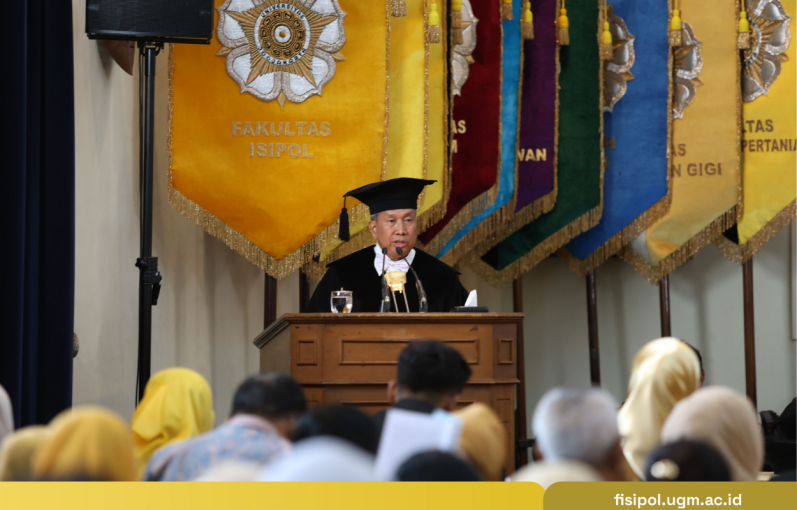
Yogyakarta, September 9, 2025–Universitas Gadjah Mada officially inaugurates Prof. Dr. Drs. Dafri Agussalim, M.A. as professor in the field of global leadership and human rights diplomacy in ASEAN at the Department of International Relations.
The inauguration ceremony brought a speech titled “Building and Strengthening Cosmopolitan Nationalism for the Fulfillment, Advancement, Respect, and Protection of Human Rights”. In the speech, Prof. Dafri Agussalim highlighted the importance of global human rights protection as a part of our collective responsibility, irrespective of state borders, citizenship, socio-economic status, or other individual attributes.
Prof. Dafri viewed the issue of human rights by reflecting upon the many cases of modern human rights violation in the world, especially in Indonesia. Violations of human rights through the acts of genocide often happens in Asia and Africa, like the genocide done by Israel towards Palestine, as well as the genocide done by the Myanmar military regime towards the Rohingya people has claimed thousands of lives.
History has not forgotten heavy human rights violations committed by the Indonesian government that has not yet been solved. Even before the era of reformasi, there were plenty of cases of human rights violations, such as the 1965 mass killings, the Trisakti Tragedy, the Semanggi Shootings, and many more. Human rights violations can also come through many forms, especially when the government fails to fulfill the socio-economic and cultural rights of its citizens.
Looking at this situation, Prof. Dafri offers the protest school perspective as one of the ways in building and strengthening cosmopolitan nationalism. Using the lens of protest school in human rights studies, the fulfillment of human rights is seen as a result of struggle in actively fighting injustice. The fulfillment of human rights did not just occur because of the state, but also from the moral powers of citizens, as well as the love of people for their country (nationalism) and solidarity for humanity worldwide (cosmopolitanism) that became important foundations for the advancement of human rights. The idea of a cosmopolitan nationalism can be seen with Indonesia’s Pancasila, where the second part endorses a just and civilized humanity.
It needs to be underlined that nationalism should not be strictly defined as ones found in the ideas of chauvinism and ultranationalism. Cosmopolitan nationalism is founded upon strong ethics and morals in order to be capable in fighting for both fulfillment and advancement of our human rights. Therefore, leading figures can act as an important actor in fulfilling human rights in the local, national, or international levels.
With that, the respect, protection, fulfillment, as well as the advancement of human rights becomes part of the agenda of sustainable development in advocating for the basic rights of citizens, such as dismantling poverty, reducing inequality between social classes, offering accessible education, as well as keeping a just and peaceful society.
